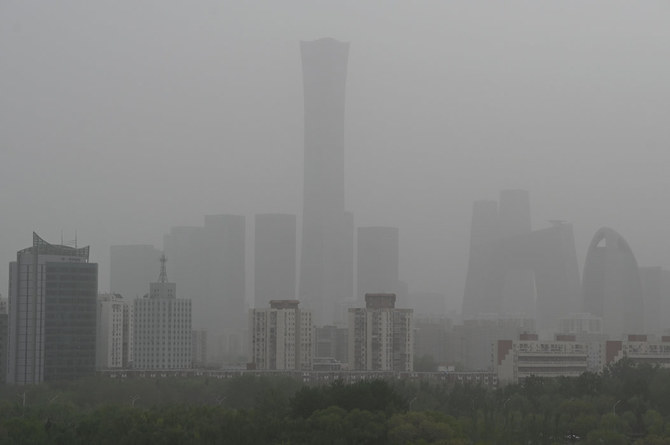
- ARAB NEWS
- 11 Jul 2025

The impact of climate change is not distributed evenly around the world and vulnerable communities, often those least responsible for contributing to climate change, bear the brunt of its consequences. This is why it is critical to ensure and achieve climate justice.
As global temperatures rise due to climate change, this is leading to more frequent and more intense heatwaves.
But certain regions in the world are more susceptible to the effects of rising temperatures. For example, many countries in sub-Saharan Africa are vulnerable to the impact of increased temperatures, changing precipitation patterns and more frequent droughts. These factors are affecting water availability, agriculture and food security.
The Middle East and North Africa are also experiencing increasing temperatures, water scarcity and more frequent heatwaves. These factors can exacerbate challenges related to water resources, agriculture and human health. Due to the dry or semi-dry environment, temperatures in MENA are rising almost twice as quickly as in other parts of the world, according to a 2022 report by the Cyprus Institute’s Climate and Atmosphere Research Center and the Max Planck Institute for Chemistry. This is why countries such as Iraq, Syria, Jordan and Iran have witnessed such significant desertification. The region was already characterized as the most water-scarce in the world.
Countries in South Asia, including India and Bangladesh, are also experiencing the impact of rising temperatures, changing monsoon patterns and an increased frequency of extreme weather events, which are most likely impacting agriculture, water resources and the livelihoods of millions of people.
This rapid warming is also leading to the melting of sea ice, loss of permafrost and is affecting the Arctic ecosystems, as well as indigenous and coastal communities and ecosystems. Low-lying island nations, such as those in the Pacific and the Caribbean, are particularly vulnerable to sea-level rise and more intense tropical storms.
The primary driver of contemporary climate change is the increase in concentrations of greenhouse gases in the Earth’s atmosphere. But even though Africa has the lowest carbon dioxide emissions of all the continents, it has been disproportionately impacted by climate change. Africa is the second most-populous continent, being home to about 18.2 percent of the world’s population (nearly 1.5 billion people), however it only emits 4 percent of the world’s carbon dioxide. To put this in perspective, North America, which is home to only 7.5 percent of the world’s population, is responsible for about 18 percent of global carbon dioxide emissions.
The US and Europe currently account for nearly a third of carbon dioxide emissions in the world. The US alone, which has about 5 percent of the world’s population, accounts for 14 percent of global carbon dioxide emissions.
When it comes to carbon dioxide emissions per capita, African countries such as Mali, Somalia, Ethiopia, Niger, the Democratic Republic of the Congo, Chad and the Central African Republic are ranked among the lowest contributors to climate change. But in spite of the fact that Africa has produced the lowest amounts of carbon dioxide emissions, it is the continent most impacted by global warming. For example, Mozambique, Zimbabwe, Malawi, South Sudan and Niger were among the 10 countries most negatively affected by climate change in 2019.
We should ensure that climate policies respect and protect the rights of indigenous peoples, marginalized communities and those most affected by climate change.
Dr. Majid Rafizadeh
This is why it is critical to work toward climate justice. To achieve climate justice, we need a comprehensive and collaborative approach that addresses the disproportionate impacts of climate change on vulnerable communities, recognizes historical responsibilities, and promotes equity and fairness in climate action.
Some of the strategies that the international community can pursue to work toward climate justice include implementing policies and practices that reduce greenhouse gas emissions, with a particular focus on the largest contributors both historically and currently.
Secondly, the international community must develop and implement adaptation strategies to help communities, particularly those most vulnerable, cope with the current impacts of climate change.
This includes providing financial support and technology transfer from developed to developing countries to help them adapt to and mitigate climate change, to provide education and training on sustainable practices, climate science and practical adaptation strategies.
Financial support is also required to invest in developing countries’ infrastructure that enhances resilience to extreme weather events, sea-level rise and other climate-related challenges. This can be achieved by establishing climate funds and mechanisms to assist vulnerable communities in developing resilience and transitioning to low-carbon economies. As the UN Secretary-General Antonio Guterres pointed out while addressing the world leaders at the UN Climate Change Conference, COP28, in Dubai: “Climate justice is long overdue. Developing countries are being devastated by disasters they did not cause. Extortionate borrowing costs are blocking their climate action plans. And support is far too little, far too late. Developed countries must show how they will double adaptation finance to $40 billion a year by 2025 as promised and clarify how they deliver on the $100 billion — as promised.”
These funds can also be used to build the capacity of local communities, especially in developing countries, to participate in decision-making processes related to climate action.
Finally, developed countries ought to promote transitioning to renewable and sustainable energy sources to reduce reliance on fossil fuels. This includes encouraging energy efficiency measures in industries, transportation and buildings.
In conclusion, we should ensure that climate policies respect and protect the rights of indigenous peoples, marginalized communities and those most affected by climate change. Through climate justice, the international community should seek to address the unequal distribution and impact of climate change by advocating for equitable solutions, emphasizing the rights of marginalized and affected communities, and holding those most responsible for climate change accountable.
• Dr. Majid Rafizadeh is a Harvard-educated Iranian-American political scientist.